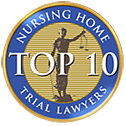Medication Errors
Medication errors pose a serious threat to Maryland nursing home and assisted living residents. Nursing homes and assisted living facilities need to keep track of all medications for all their residents, many of whom take multiple medications, which can constantly change. Simple errors such as failure to give medication prescribed by a physician, misunderstanding directions or giving drugs in the wrong dosage can result in serious illness or death for a nursing home or assisted living resident.
Medication errors can occur due to negligence by nursing home staff and may be a sign of medical neglect. If you or a loved one has been injured or killed because a Maryland nursing home or assisted living facility committed a medication error, we may be able to help.
The U.S. Food and Drug Administration defines a “medication error” as:
- Any preventable event that may cause or lead to inappropriate medication use or patient harm while the medication is in the control of the health care professional, patient or consumer.
- Such events may be related to professional practice, procedures and systems, including prescribing, order communication, labeling, packaging, compounding, dispensing, distribution, administration, education, monitoring and use.
Medication-related injuries are a widespread problem in nursing homes, according to a report issued in 2014 by the inspector general’s office of the U.S. Department of Health and Human Services. Its findings were:
- A third of patients in skilled nursing facilities suffer some type of harm due to mistakes by nursing home staff, and 37% of those injuries were the result of medication-related events.
- 59% of the harm was preventable, according to doctors who reviewed the patients’ records.
- 22% of patients suffered lasting harm.
- 11% were temporarily harmed.
- 5% died as a result of mistakes by nursing home staff.
- More than half of those harmed needed to be readmitted to the hospital, costing Medicare an estimated $208 million for the month studied, August 2011.
- Projecting the statistics nationally, the study estimated that 21,777 patients were harmed and 1,538 died due to substandard skilled nursing care during that month (with 37% of the harm done by medication-related events).
The study focused on treatment in nursing homes for up to 35 days after a patient was discharged from an acute care hospital. Doctors working with the inspector general’s office reviewed medical records of 653 randomly selected Medicare patients from more than 600 facilities.
A 2012 study of nursing home care in North Carolina found thousands of medication errors. Many of the errors occurred multiple times before they were discovered.
- Medication errors often occurred during transitions from hospital, home or another facility.
- There were a total of 14,526 medication error incidents reported in fiscal year 2012 by 398 nursing homes.
- The mean number of incidents per nursing home was 36, with an average of 30 errors per 100 beds.
- 4,988 (34.3%) errors were repeated at least once, with an average of 12.3 repeats before the error was discovered.
- There were a total of 61,730 total repeat errors including the original one, with an average of 155 repeat errors per nursing home.
- These repeat errors resulted in 346 incidences of temporary harm, and 202 residents had to transported to a hospital emergency department due to the errors.
- The types of errors were dose omission errors (44%), wrong documentation (19.1%), overdose/multiple dose (7.0%), wrong strength (6.5%), wrong product (4.0%), wrong patient (3.5%), and wrong time (3.1%).
- For the errors that were considered serious, the wrong patient was medicated 23.6% of the time. Other serious situations were use of an expired product (26.1%) and allergic reaction (22.9%).
- The drugs most commonly involved in errors were the blood-thinning medication warfarin and insulin.
- Warfarin errors are most likely to be from transcription errors, communication problems, inadequate information and shift change.
Nursing home mismanagement of blood-thinning medications, such as Coumadin or warfarin, can have deadly results. A study of residents in 25 Connecticut nursing homes over a twelve-month period found:
- 720 adverse warfarin-related events and 253 potential adverse warfarin-related events.
- Of the adverse warfarin-related events, 625 (87%) were minor, 82 (11%) were serious and 13 (2%) were life-threatening or fatal.
- 29% of all the adverse warfarin-related events were preventable.
- 57% of the more severe events were preventable.
- Errors resulting in preventable events happened most often when the drug was prescribed and during the monitoring of warfarin use.
If you or a loved one has been injured or killed due to a nursing home or assisted living medication error, contact our office so we can talk about what happened, applicable laws and your best options to stop the errors from happening and obtain compensation. If you have observed, or even suspect, neglect or abuse of a loved one in a Maryland nursing home or assisted living facility, call 410-825-3161 to begin an investigation that may result in compensation and justice.


 Roger Weinberg is a skilled and experienced attorney who has pioneered the legal field of representing Nursing Home, Assisted Living, and Developmental Disability victims and their families who have experienced abuse, neglect and wrongful death. He is a leader in this field and teaches other lawyers, students and medical personnel about the laws impacting such cases. [
Roger Weinberg is a skilled and experienced attorney who has pioneered the legal field of representing Nursing Home, Assisted Living, and Developmental Disability victims and their families who have experienced abuse, neglect and wrongful death. He is a leader in this field and teaches other lawyers, students and medical personnel about the laws impacting such cases. [ 



